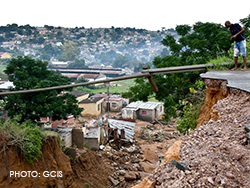
Delivering his department’s budget vote, the Minister of Water and Sanitation, Mr Senzo Mchunu, said: “We are debating our budget at a difficult time, following devastating floods in various parts of the country, KwaZulu-Natal in particular.” He assured those affected by floods that a war room has been established that, with the worst-affected municipalities, will address their basic water and sanitation needs.
During a water and sanitation summit, the department was able to develop a good understanding of the country’s water challenges and achieve a consensus on what needs to be done. One of the department’s major turn-around strategies is the inception of National Water Resources Infrastructure Agency, which will be the custodian of national water resources, he told Members of Parliament. This agency will leverage large-scale investments in national water resource infrastructure to secure sufficient bulk water supply now and in future. This agency will be legislated after cabinet’s approval and a draft business plan has been submitted to National Treasury for comment.
The minister went on to report on various provincial projects, including one in the Eastern Cape, the Mzimvubu Water Project, which aims to provide water to 750 000 people at a cost of R25 billion. In the Free State, a R10 billion project to build a major pipeline from the Xhariep Dam to augment water supply in Mangaung is at the feasibility stage. The department is also busy rationalising the water boards, which are inefficient and poorly governed, the minister said.
The department has been allocated R59.6 billion over the medium-term expenditure framework. Conditional infrastructure grants for municipal water services amount to R 3 439 billion over the MTEF, which includes R19 billion for the Regional Bulk Infrastructure Grant and R14 billion for the Water Services Infrastructure Grant. The Water Trading Entity was allocated R9.55 billion.
The Chairperson of the Portfolio Committee on Water and Sanitation, Ms Mfana Mashego, said that since 1994 the government has ensured that every household has access to water and sanitation where ever they reside. She further advised that when the department hands over water infrastructure, it must ensure that municipalities have the capacity to maintain and manage them. She also welcomed the department’s intention to support municipalities to improve their debt collection and to generate their own revenues.
She also welcomed revised procurement regulations to support President Cyril Ramaphosa’s State of the Nation call for procurement to be allocated to women, youth and people with disabilities.
Responding to the minister’s address, Mr Leon Basson of the Democratic Alliance urged the minister to ask the Special Investigation Unit to investigate the R35 million “kickback” paid out for a SAP contract. He also expressed displeasure about the quality of South Africa’s water supply. “The report reveals that 48% of the country’s water supply systems were judged to be low risk, 18% medium risk and 34% high or critical risk.”
Public/private partnerships are the solution to this crisis, he argued. “The DA believes that through meaningful public/private partnerships, a solution can be found. Water specialists indicated that more than R900 billion will be needed in the next 10 years on infrastructure, to avoid a full-scale water crisis.”
The grave lack of access to water and sanitation among some citizens requires extraordinary government measures, was the view of Economic Freedom Fighters’ Ms Mathibe Mohlala. Only 5.3 million households have to access to clean water and adequate sanitation and the department’s own master plan indicates a growing gap between demand and supply, she said.
The Inkatha Freedom Party’s Ms Sbuyiselwe Buthelezi believes that most of South Africa’s water problems stem from poor maintenance of bulk water infrastructure. The recent floods in KwaZulu-Natal should not be blamed for poor access to water, the IFP believes. “Those who will stand before this house and claim so will be misleading it. The department must come up with a draft budget to address the devastation caused by floods and further address the ongoing problem of the shortage of water in the province.”
Abel Mputing
16 May 2022

